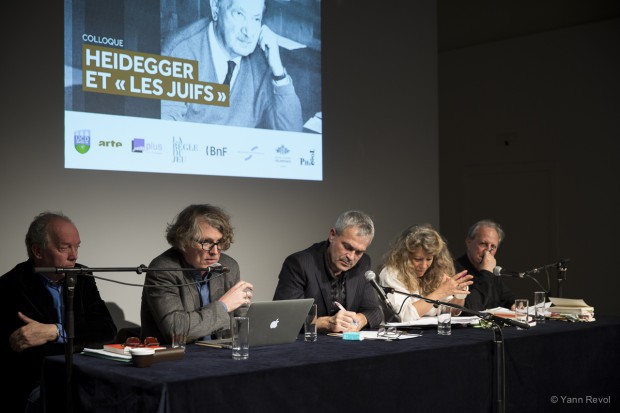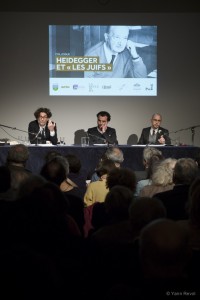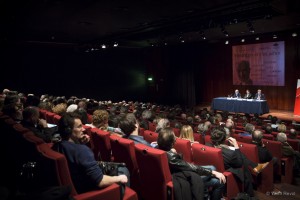
The importance of Martin Heidegger’s work for 20th century philosophy can hardly be overstated. Sartre’s existentialism, Derrida’s deconstruction, Levinas’ ethics, and the political thought of Hannah Arendt, Leo Strauss, and Herbert Marcuse – Heidegger exercised a formative influence on all of them. All the same, Heidegger’s engagement with Nazism in the early 1930s casts a shadow on his reputation to this day. How far this political affiliation reached and what it implies for his standing as a philosopher has been subject to fierce debate for many decades now.
From February 1933 to April 1934, Heidegger was the Nazi-appointed rector of the University of Freiburg. He soon quit over disputes with the party, although he formally remained a party member until the end of the war. By some accounts he later called his political engagement the “greatest stupidity of his life”, but no written record exists of such confession, and after the war he never thought it necessary to issue a public mea culpa. Some say that he did protect Jewish friends and colleagues as rector, while some say that he denounced others. It is clear that in his writing he often condemned Nazism: sometimes subtly, between the lines, and sometimes explicitly alongside communism, capitalism, and science. However, some argue that certain strands of Nazi thought pervade even the deepest strata of his philosophy.
These debates come and go, in regular intervals. As the publishing of the Gesamtausgabe, Heidegger’s collected works, continues, new material comes to light that seems to support either side. Almost 40 years after Heidegger’s death the final volumes of the series are being published. They contain his notebooks – the infamous Black Notebooks, SchwarzeHefte – a vast collection of philosophical observations dating from the early 1930s onwards. The texts from 1931 to 1941 have been published, while the rest is awaiting publication. Before his death, Heidegger himself ordered that these would be the last things to be published in the frame of the Gesamtausgabe – and they heavily reignited the debates about his anti-Semitism.
While Heidegger was seen as a Nazi by many people, until recently his anti-Semitism, though oft suspected, was never firmly established. Besides personal friendships with Jews, in his famous 1967 Spiegel interview he also claimed to have defended Jewish academics as a rector in Freiburg and to have forbidden the burning of books. The Black Notebooks radically contest and complicate this picture. Of the thousands of pages only a handful of passages mention the Jews and Jewish thought – less than 15 in total so far – yet they paint a dark picture.
The accusation brought forth against Heidegger in the light of these new publications, most notably by the editor of the Black Notebooks, German scholar Peter Trawny is then the following: from Plato onward, according to Heidegger, Western history and philosophy have been characterized by a common error, the forgetting of Being. Platonism, Christianity, Humanism, Liberalism, Science, Capitalism, Nazism, Bolshevism – they all appear as different avatars of the same fall – Metaphysics, or, what is essentially the same for him, technology (Technik). The advent of modern technology, of planetary-scale industrial production, in light of which all being appears as mere resource, ready for exploitation, constituted the culmination point of Heidegger’s narrative of (philosophical) history.
The revelation within the Black Notebooks is that it seems like Heidegger saw the Jews as just another avatar of the same technology. But if the Jews are the ontological precursors of modern technology – does not the Holocaust, the industrialized killing of millions, appear as technology turning against its own source? Does not the Holocaust then appear as an auto-destruction of the Jews, who suffer at the hands of what their own philosophy and religion brought about? The charge is then that Heidegger raises anti-Semitic clichés to a philosophical status.
And so it was but a question of time until a conference was set up, for scholars from all over the world to convene and debate, and perhaps decide, the fate of Heidegger. This tribunal (as some called it), entitled “Heidegger and the Jews”, was in session from January 23rd to 26th, 2015 in Paris, co-hosted by the BibliothèqueNationale de France, and the Centre CulturelIrlandais (CCI), and organized by Joseph Cophen and Raphael Zagury-Orly. The following is a report of what happened there.
*

The first session on Thursday started at full-speed with two keynote addresses by the eminent French scholars Alain Finkielkraut and Jean-Claude Milner. The former is one of France’s most prominent conservative thinkers and cultural commentators, the latter a philosopher of language and psychoanalyst, who studied with Roland Barthes, Jacques Lacan, and Louis Althusser, to then turn towards Chomskyan linguistics on the other side of the Atlantic. His work has since repeatedly crossed the intellectual demarcation lines between the two shores of the great pond.
Finkielkraut started and centred his talk on the relation between Heidegger and one of his most important students and critics, the French philosopher Emmanuel Levinas. While at the heart of Heidegger’s thought stands a call for a renewed attention to Being, Levinas highlights the importance of deep respect for the Other; where Heidegger talks about ontology, Levinas insists on the importance of ethics. Levinas thus points out an elementary blind spot in Heidegger’s thought. At the same time, Finkielkraut argued, the same can be said of Heidegger with regards to Levinas! In his essay “Heidegger, Gagarin, and Us” Levinas celebrates the fact that a human being existed unbound, in absolute geometrical space, detached from all earthly roots. Levinas, Finkielkraut suggested, picked up the charge of supporting a free (floating), uprooted modern subjectivity as a badge of honour and contended that Heidegger’s critique of technology and such uprootedness remain an important corrective to Levinas’ thought.
Jean-Claude Milner took things much slower. Very carefully, he inquired into the relation between Heidegger’s language and the innovations it brought about in German academia and politics of the 1920s and 30s. The local intelligentsia’s German back then, according to Milner, was primarily the German of Luther and Goethe – a Protestant German, that had blended with the German of the Jewish bourgeoisie in a Prussian “alliance” against the Hapsburgian Catholic South. When Heidegger became the centre of attention for German intellectual life, after the publication of Sein und Zeit in 1927, he came with the intention to radically change the front lines. In his infamous address as rector of the University of Freiburg on “The Self-Assertion of the German University”, Milner suggested, he was countering Max Weber’s (Protestant) ideals, as laid out in his 1917 speech “Science as Vocation”. Against Weber’s anti-prophetism and sober professionalism, Heidegger proposed an idea of the (philosophy) professor as a prophetic figure. After his resignation as rector he came to see that the Nazis could not offer the conservative revolution he had hoped for, but even after 1945 he continued to adhere to his plans of renewing and de-Lutherizing the German language. Milner ended on the suggestion that Luthero-Goethian German died with the Jews in the Holocaust, suggesting that Nazi politics, as much as Heidegger later belittled them, in some horrible way also contributed to the realization of some of his philosophical goals.
The discussions on this first day remained very quiet, at least compared with what was to come. The second day featured Peter Trawny, who reiterated his point that in Heidegger’s narrative the Holocaust has to appear as auto-destruction of the Jews. He noted that Heidegger’s topography mirrors the front lines of World War Two: here the Germans and Greeks, besieged on two sides by Russian Bolshevism and American capitalism – with the exception that in Heidegger’s story there are no winners and no losers, no victims and no perpetrators: all sides and places eventually appear doomed by the unstoppably progress of planetary, technical Machenschaft – the meaning of which oscillates between fabrication and conspiracy.
Other presentations continued in a similar vein, raising parallels with Carl Schmitt, one of the Nazis’ foremost legal theorists, and thoughts about the long tradition of anti-Semitism in German philosophy (Luther, Kant, Hegel…). One person referred to Heidegger’s philosophy as “penséecriminelle” – criminal thought – while another provocatively demanded to know why Heidegger isn’t actually right about what he’s saying. Though the questioner did not specify what exactly he was referring to, the question caused some tumult.

The evening keynote was given by Peter Sloterdijk, the prolific German star philosopher, famous for provocative play with the taboo on eugenics, condemnations of the well-fare state, and for hosting a popular philosophical German TV show. He started talking, in impeccable French, about tensions in Heidegger’s notions of time in his early work of the 1920s: the individual’s time, marked by mortality and being-towards-death versus a historical time that approaches the cyclical time of nature. Only towards the end of his talk did he finally turn to the Black Notebooks and to the question of Heidegger’s anti-Semitism: in a side-remark he mentioned, almost as an afterthought, that anything Heidegger wrote after Sein und Zeit need not concern us much. Such silence on the issue seemed more devastating for the Heideggerian camp than even the most elegantly worded critique. He signed a few books afterwards and left the scene rather quickly.
*
After witnessing for some time what looked like “the death of Heidegger” and the “victory of ressentiment”, as one speaker put it in conversation, François Fedier took the stage on the evening of the next day. Supervisor of the French translation of the Gesamtausgabe, the torch-bearer of the Heideggerian camp proceeded to mount a respectable defence to defeat Trawny’s accusations point-by-point. A veteran of countless similar debates he had been defending Heidegger for decades, and responded with careful close-reading and scholarly erudition.
The hall at Centre CulturelIrlandais, at the heart of Paris’ university district, had been full to the last spot since the early morning hours and, having arrived half an hour before Fedier’s talk, I found before its doors a crowd of about twenty people, most of them well beyond their fifties, haggling with a big Irish bouncer to gain access. At first it seemed like they were able to negotiate that one person would be let in for every person that leaves during the break. However, after the previous session had ended and several people had left it was announced that the hall inside was still too crowded to let more people in. Fifteen minutes passed. At some point the bouncer stopped answering the door. Another fifteen minutes. Occasionally some people left – “Has the next talk started yet?”, “No, there’s still a Q&A”. Our group of twenty people shrunk down to about ten. After a total of one hour in the cold we managed to convince a second bouncer, who had replaced the first one, to let us in and made it just in time for Fedier’s presentation.
His overall strategy of defence is best described as audacious. He began by establishing that Heidegger always firmly followed the (Hegelian) key insight that every “anti-“ always remains committed to thinking at the level of what it negates. Consequently, Fedier argued, the Nazis, in their anti-Semitism, appeared to Heidegger mirroring the Jew that they conjured up in their propaganda. The risky point here is of course that – unless you make it very clear that the Nazi’s imagery of the Jews has really nothing to do with the Jews, and it is not clear that Heidegger does – it might come down to the embarrassing question of who you are insulting more with this equation, the Nazis or the Jew? Simultaneously, it explained, according to Fedier, why Heidegger was never content to declare himself an anti-Nazi – after all this would have meant for him to merely stay on the same base level as the Nazis – which is quite convenient, of course.
Fedier didn’t stop at that. When Heidegger talks about Hitler as a prophet, he contends, he is referring to him as a pseudo-prophet. The true (Biblical) prophets would dissimulate their prophetic status as teachers not of a secret (Geheimnis), but something ineffable (Geheime; Luther’s translation for the Greek mysterion). Trawny supposedly conflates the two. Similarly, he argues that Heidegger’s description of Hitler’s anti-Semitism as töricht, foolish, takes on a wholly different gravity when one takes into account that it is also Luther’s translation of the Greek aphron – which roughly means the same, but in Ancient Greek. Trawny doesn’t distinguish between Heidegger’s use of the term rassig (classy) and rassisch (racial). Heidegger mentioned anti-Semitic clichés and Fedier cited at length the extended passages to show how Heidegger does not take aboard the pejorative meaning, but rather mocks it subtly.
Most importantly he points out that a different reading of the term Weltjudentum, (world Jewry, or, perhaps more literally, world Judaism), yields less support for Trawny’s auto-destruction thesis. French allows a range of translations for Judentum: the highly pejorative juiverie, as well as the more neutral judéité or judaïsme. Fedier sees a tragic clash between planetary-scale technology and the Jewish world, rather than an auto-destruction of the Jews. To completely drive his point home he concludes by telling a rabbinic story of how two people argue about the Talmud and need to be reminded by a sage Rabbi not to speak unqualifiedly for the other person. In the end the textual evidence that he marshals seems quite convincing. The applause lasted for several minutes.
Trawny replies. A hermeneutic that takes the words of a philosopher as presupposition is not a philosophical hermeneutic. Heidegger doesn’t call Hitler a (false) prophet, that’s entirely Fedier’s interpretation. Equating Nazis and Jews is an anti-Semitic trope. Weltjudentum is an indisputable reference to the anti-Semitic Protocols of the Sages of Zion. Fedier counters that Trawny’s reading is deliberately uncharitable and that yes, the description of Hitler as false prophet is in the text, which Trawny should go read. The curtain drops.
*

The entrance policy did not get any looser on the last day. Even Sloterdijk had to wait ten minutes in front of the building before he and a select group of well- connected initiates are allowed in. But the CCI has learned from the past day and provides an extra room with a live audio feed for the remaining group. The last panel goes to the organizers of the conference, the last keynote to Bernard-Henry Lévy, the omnipresent liberal French intellectual (whose talk was printed in abridged form and translated by the HuffPost). Raphael Zagury-Orly draws attention to a seminar that Heidegger gave in the 20s about St. Paul, in which he found support for many of Trawny’s theses. Then Lévy speaks.
He just arrived in Paris after giving a talk in the US before. He apologizes for having missed the previous days of the conference. He thanks everyone for the invitation and for joining. Very carefully he proceeds to weigh the arguments of both sides in the case Heidegger. He revisited the history of the controversy: for the first time, Heidegger explicitly talks about the Jews in his writing and he is still not asking for a pardon for his early engagement with Nazism. But of course he was not surprised by Heidegger’s taking up anti-Semitic clichés. His comparison of “Americanism” with Nazism, Lévy found “trèstroublant” – very troubling.
“On the other hand”, he reminded his audience, “Sartre’s beautiful philosophy of freedom” was crucially influenced by Heidegger. And he cites other points in which Heidegger’s thinking remains relevant for us today: the historicity of our human existence and philosophy as elementary condition for political critique; the question of the importance and nature of language, where Lévy contends that Heidegger was the “last Cratylean”, who thought an essential link between words and objects, between Ding and Dichtung. Finally, the question of Being as such – which Lévy suggest we could take in a metaphorical manner: the forgetting of being as an image, an explanatory hypothesis, a bit like the State of Nature in early modern philosophers. Philosophy did not end with Kant’s overcoming of metaphysics, nor with the Hegelian end of history. It must not end with Heidegger’s history of Being.
*
In the end Lévy reinstated what everyone already knew before the conference started – yes, he was a Nazi; yes, he was also a great philosopher. In almost a comic twist of events the debate thus returns to its starting point. And yet, there is more to it: for is there not a very beautiful, almost poetic justice in taking his philosophy a bit more “metaphorical” on some points, in reading him generously but also conveniently, in, finally, extending to him a liberal gesture of tolerance and pardon? The liberal sublation – that very liberalism that Heidegger so much despised, and that is now both pardoning and appropriating him – might turn out to be remedy and punishment for him at once. What is left for us? Some laughter and, perhaps, a little bit of wisdom.
*
Post-script: For those who want to read further into the details of the debate, I have compiled here a selection of useful links. A fuller and regularly updated collection of online resources can be found here. In no particular order:
– Some good English introductions to Heidegger’s thought with a focus on the Nazism/anti-Semitism debate: 1, 2, 3 (the last by former BCB faculty Judith Wolfe).
– Levinas’ “Heidegger, Gagarin, and Us” (short read!), in English and French.
– German interview with Herman Heidegger, Martin’s son, in the ZEIT
– The official first presentation of the Black Notebooks, with editor Peter Trawny.
– A conference with Peter Trawny, Babette Babich, and Bard College’s Roger Berkowitz, as well as the latter’s article about it in The American Interest.
– A review of Faye’s Heidegger: The Introduction of Nazism into Philosophy.
– The chairman of the German Heidegger Society, Günther Figal resigned from his post just days before the conference, which caused great unease among Heidegger scholars. He gave a radio interview and a newspaper interview to explain his decision (German only, unfortunately.)
– Alain Badiou’s take on the issue (in French), and Jean-Luc Nancy’s views (in German).

that nice post